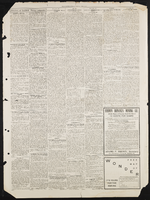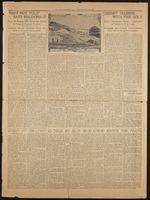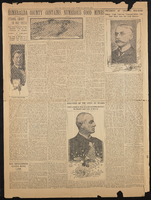Search the Special Collections and Archives Portal
Search Results

Interview with Bruce Walter Church, April 27, 2004
Date
Archival Collection
Description
Access note: May not quote in any form without written permission from interviewee
Text

Interview with Harold David Cunningham, March 11, 2004
Date
Archival Collection
Description
Text
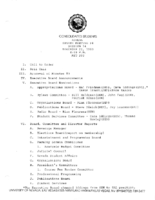
Meeting minutes for Consolidated Student Senate, University of Nevada, Las Vegas, November 22 1983
Date
Archival Collection
Description
Text
Ariana Saunders (The Corporation for Supportive Housing) oral history interview conducted by Kelliann Beavers and Elia Del Carmen Solano-Patricio: transcript
Date
Archival Collection
Description
From the Lincy Institute "Perspectives from the COVID-19 Pandemic" Oral History Project (MS-01178) -- Community organization interviews file.
Text

Transcript of interview with Bob Arum by Barbara Tabach, October 20, 2016
Date
Archival Collection
Description
Bob Arum is the founder and CEO of Top Rank boxing promotions company in Las Vegas, Nevada. Born in New York, Arum is a former attorney and a member of the International Boxing Hall of Fame. He promoted his first fight for Muhammad Ali in 1966 and moved Top Rank’s headquarters to Las Vegas in 1986. He has produced countless fights in the city and helped to make it “The Fight Capital of the World.” In this interview, Arum talks about the path that led him to a career in boxing promotion, from childhood in Brooklyn, New York, to education at New York University and Harvard Law School, and finally meeting Muhammad Ali while working at New York law firm. He discusses his work with Ali, as well as other boxers, including Marvin Hagler, Sugar Ray Leonard, Tommy Hearns, Roberto Durán, George Foreman, and Oscar De La Hoya, and the growth and evolution of the sport over the past forty years. In addition, Arum talks about the role of Judaism in his life, his involvement with the local Jewish community, and the importance of the Chabad movement.
Text

Transcript of interview with Judge Lee Koury by Claytee White, February 6, 2013
Date
Archival Collection
Description
Born in 1932 and raised in Los Angeles; mother was a housewife and later became a painter; mention of Olvera Street; Pio Pico first Mexican governor of California; Pico House; member of the Army; Deputy Sheriff; Mother Pauline Brown and father Lee Koury; Los Angeles County Sharon Tate; LaBiancas; Spahn Ranch; "the three girls on the comer" - Lynette Fromme, Sandra Good, and Nancy Pitman; Family - referring to the Manson case - Charles Mason, Robert Beausoleil, Susan Atkins, Steve Dennis Grogan, Patricia Kernwinkle, Mary Theresa Brunner, Bruce McGregor Davis, and Leslie VanHawten; Shorty Shay the person in charge at Spahn Ranch; mention of Polaroids mailed to prisoners that ended up being an important part of the Manson case.
Text
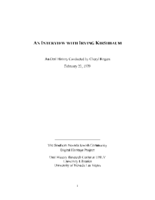
Transcript of interview with Irving Kirshbaum by Cheryl Rogers, February 23, 1979
Date
Archival Collection
Description
Interview with Irving Kirshbaum by Cheryl Rogers on February 23, 1979. In this interview, Kirshbaum discusses the Riviera Hotel where he began working in 1955. He also talks about the landscape of the Las Vegas Strip in the 1950s, and the state of gambling, comps, customer service, and dealer training. The interviewer asks about the treatment of minorities at the Riviera, and in Las Vegas generally, and the effect of corporate ownership on casinos.
Text

